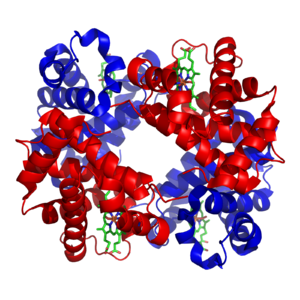Hemoglobinuria
| Hemoglobinuria | |
|---|---|
 |
|
| Structure of hemoglobin | |
| Classification and external resources | |
| ICD-10 | R82.3 |
| ICD-9-CM | 283.2, 791.2 |
| DiseasesDB | 19635 |
| MeSH | D006456 |
In medicine, hemoglobinuria or haemoglobinuria is a condition in which the oxygen transport protein hemoglobin is found in abnormally high concentrations in the urine. The condition is often associated with hemolytic anemia, in which red blood cells (RBCs) are destroyed, thereby increasing levels of free plasma hemoglobin. Excess hemoglobin is filtered by the kidneys, which excrete it into the urine, giving urine a purple color.
Hemoglobinuria can lead to acute tubular necrosis which is an uncommon cause of a death of uni-traumatic patients recovering in the ICU .
The diagnosis is often made based on the medical history, blood samples, and a urine sample. The absence of urine RBCs and RBC casts microscopically despite a positive dipstick test suggests hemoglobinuria or myoglobinuria. The medical term for RBCs in the urine is hematuria.
...
Wikipedia
